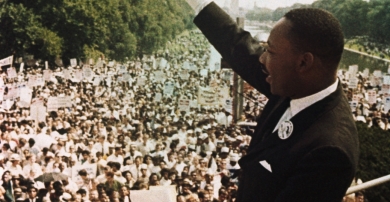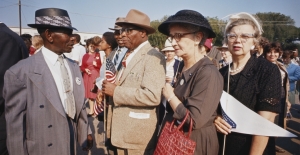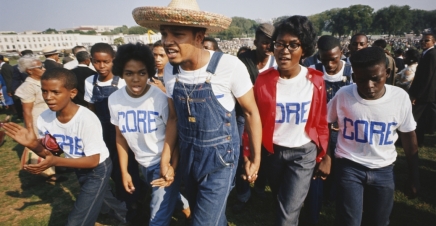Don’t judge each day by the harvest you reap, but by the seeds you plant. (Robert Louis Stevenson)
Along with debates, campaign speeches, and a slew of primaries, election years seem to bring out the cynics among us, all of them asking, “What’s the point?” Undoubtedly, there are some born-to-be-negative cynics, but I suspect most cynicism springs from disappointed idealism. People who hold a much-cherished Big Picture of a perfect world, and feel cheated and angry when it fails to materialize. All measures short of complete victory are tantamount to failure.
In all this, the Little Picture—the stories of real people in real time, their welfare, their fate—tends to get lost.
 Let me be clear: Having a Big Picture view is essential to progress. Big Picture thinking allows us to see the connections between seemingly disparate events. It enables us to consider the extent of a situation: Is it local, national, global? An isolated incident, a series of coincidences, or a systemic issue? Grasping the Big Picture is key to formulating long-term goals and strategies. As the folk song says, it’s about keeping our “eyes on the prize.”
Let me be clear: Having a Big Picture view is essential to progress. Big Picture thinking allows us to see the connections between seemingly disparate events. It enables us to consider the extent of a situation: Is it local, national, global? An isolated incident, a series of coincidences, or a systemic issue? Grasping the Big Picture is key to formulating long-term goals and strategies. As the folk song says, it’s about keeping our “eyes on the prize.”
But, the Little Picture is where we live.
It’s where those featureless pixels in the Big Picture become recognizable faces, grow names, sprout human needs. Where a family of refugees tugs at your heart because you have a family, or have lived through a disaster, or are the child of immigrants. It’s the picture in which we recognize our humanity in the faces of others.
The Little Picture is not a selfie. It’s not about viewing the world from the comfort of your own armchair and asking “What’s the problem? I’ve got mine, Jack.” Not the egocentric attitude expressed by Mel Brooks’s character in The 2,000 Year Old Man: “Let ‘em all go to hell except Cave 76!”
It’s about seeing the actual lives behind the numbers. It’s about the significance of helping someone even when you can’t help everyone. It’s about remembering that someday, somewhere, that someone in desperate need of immediate aid may turn out to be your child, your parent, you. It’s the answer to “What’s the point?”
in desperate need of immediate aid may turn out to be your child, your parent, you. It’s the answer to “What’s the point?”
I was reminded recently of the significance of the Little Picture—how far its ripples on the larger pond can travel— in an e-mail from North Carolina Policy Watch. It seems that Americans tend to be pretty blasé about the routine nuts and bolts of our democracy, such as the selection of federal judges (which, by the way, is directly related to who’s in the Oval Office and who has the majority in the Senate). The federal judiciary is not the stuff of pumped-up passion and fireworks. Many of us would be hard-pressed to name even one federal judge. Yet, it wasn’t the Supreme Court, but the United States Court of Appeals for the Fourth Circuit that struck an “… immense blow for the future of democracy, inclusion, and the effort to combat discrimination” when it ruled North Carolina’s voter suppression law unconstitutional on July 29 of this year (NCPW). Similar U.S. Court of Appeals decisions have come down recently in Texas and Wisconsin.
Are these individual state rulings as good as Congress restoring the Voting Rights Act in its entirety? No. Are these decisions, which enable several million students and non-white voters (both targets of voter suppression) to have a voice in our elections, better than waiting for Congress to restore the VRA? Undeniably.
Waiting for Godot: The Perfect vs. the Good
 Voltaire wrote: Don’t let the perfect be the enemy of the good. The Big Picture is often the image of an ideal: Health care for everyone. Adequate housing and education for all people. Environmental standards that not only halt damage to the planet but actually reverse the destruction to our air, water, and soil. An end to all violence worldwide.
Voltaire wrote: Don’t let the perfect be the enemy of the good. The Big Picture is often the image of an ideal: Health care for everyone. Adequate housing and education for all people. Environmental standards that not only halt damage to the planet but actually reverse the destruction to our air, water, and soil. An end to all violence worldwide.
These Big Picture goals are admirable, majestic, profound. But the roughly 20 million Americans who now have health insurance, thanks to the Affordable Care Act, are not just numbers. They are diabetic teens and adults who did not die due to a pre-existing condition. They are children who did not die from a strep throat or a ruptured appendix because their parents cannot afford to pay $800 a month with a $3,000 deductible—in essence, paying an insurance company $10,000 a year and then having to pay for most or all of their healthcare expenses. They are people working 2-3 part-time jobs, whom no one will hire full-time because that would mean giving them benefits, including healthcare coverage.
So, is the ACA a failure because 30 million Americans still remain uninsured? As one of the millions of self-employed workers for whom it made healthcare possible, I am grateful every day. As one of the 7.4 billion human beings on this planet, I know we still need to do more.
But waiting for a perfect world, a perfect system, the perfect candidate—it’s like waiting for Beckett’s Godot. It just ain’t comin’. And nothing in history supports the idea that it ever will. So we can sit on our hands in protest at the imperfect or we can dive into the fray, do what we can to improve things for more people, and make good with what we get. In truth, I’m convinced it’s the only way to achieve anything. The journey of a thousand miles always begins with a single step. We start with the Little Picture and strive to paint a larger, wider canvas from there.
The Civil Rights Act of 1964 speaks to this eloquently.
Because in 1961, black and white civil rights activists rode interstate buses into the segregated South. These “Freedom Riders” wanted to highlight the Interstate Commerce Commission’s failure to enforce earlier Supreme Court decisions that had ruled segregated public buses unconstitutional (Irene Morgan v. Commonwealth of Virginia, 1946; Boynton v. Virginia, 1960).
Because in 1960, four black students held a sit-in at a whites-only lunch counter in Greensboro, North Carolina. Within a week, the movement grew from four to 300, and the sit-ins fanned out to other segregated lunch counters in Greensboro, then to other cities and states across the Jim Crow South.
Because in 1957, the “Little Rock Nine”—nine black students, registered by the NAACP and escorted by federal troops—became the first black pupils to attend the all-white Little Rock Central High School.
Because in 1955, Rosa Parks sat down on a bus and refused to give up her seat to a white woman when the whites-only section was full, thus sparking the Montgomery Bus Boycott.
Because a woman named Sarah Louise Keys had done something similar in 1952, as had Bayard Rustin in 1947, and Irene Morgan in 1944. Back and back to Sojourner Truth and Frederick Douglass.
None of these actions freed all black Americans forever from discrimination and the savage violence of racism. Sadly, more than 50 years later we have ample proof of that. But that doesn’t diminish the  significance of these advances or the courage of the participants or the outcomes of their actions. Taken separately, they are all Little Pictures. But they are also pieces of a much larger picture, one we are still painting. And despite setbacks, despite backlash, they have added up to real change for many, many Americans. That we still have a long way to go does not negate the lives improved, the lives saved. Each of them is, after all, someone’s only life.
significance of these advances or the courage of the participants or the outcomes of their actions. Taken separately, they are all Little Pictures. But they are also pieces of a much larger picture, one we are still painting. And despite setbacks, despite backlash, they have added up to real change for many, many Americans. That we still have a long way to go does not negate the lives improved, the lives saved. Each of them is, after all, someone’s only life.
The Starfish Story
I first heard the Starfish story when I was doing my M.Ed. It goes something like this:
A man is walking along the ocean and sees a beach where thousands and thousands of starfish have washed ashore. Further along he sees a young woman picking up one starfish after another and tossing each one gently into the ocean.
“Why are you throwing starfish into the ocean?” he asks.
“Because the sun is up and the tide is going out and if I don’t throw them further in they will die.”
“But,” the man says, “don’t you realize there are miles and miles of beach and starfish all along it! You can’t possibly save them all, you can’t even save one-tenth of them. In fact, even if you work all day, your efforts won’t make any difference at all.”
The young woman bent down, picked up another starfish, and threw it into the sea. “It will make a difference to that one.”
Everything we do that makes life a little better for another person matters.
And that’s the point.
Source: All photos from the March on Washington, August 28, 1963:



In my opinion, this is the best blog entry that you have written. Yes, too often we sink into a sea of despond ruing our big-picture defeats while forgetting to voice a little hurrah at our tiny victories. And yet it is those wee victories, piled one on the other, that ultimately deliver grand victories. Thank you for this and all your blog posts.
LikeLike
Keep on trucking, as we used to say in the Dark Ages. (Thanks, Ed.)
LikeLike
Excellent article!
LikeLike
Thanks, Dan! Always good to hear from another writer.
LikeLike
This is very timely, Amy. I wish all the ardent Bernie Sanders supporters who are disappointed that he did not get the Democratic Party nomination could read it. Because guess who appoints the federal appellate judges who make those momentous decisions: the woman (or man) in the White House. God forbid it should turn out to be Mr. Trump.
LikeLike
Thanks, Tom. I think the thing all voters have to come to grips with is that SOMEONE will win in any election. Sitting it out doesn’t make it not happen. It just means you don’t get any say in the matter. The second, much darker truth is that it’s important to understand EVERYTHING can be taken from you. History bears this out: nothing is guaranteed you in this world. Therefore, it’s always in one’s best interest to participate.
LikeLike
I wish all the young people who don’t vote would read your post. I guess they think that their one little vote won’t make a difference. It’s a self-defeating attitude. Thanks for your post!
LikeLike
Thanks, Toni. I completely agree with you and for all the reasons I just mentioned in my reply to Tom (above). When people say their vote makes no difference, they should ask themselves how world history might have changed if the Nazi Party had not made massive gains in the elections of 1932, which paved Hitler’s path to become chancellor in 1933, and allowed him to consolidate all power (by unilaterally merging the posts of chancellor and president) into his hands in 1934. Elections have consequences.
LikeLike
Thank you for this reminder. I needed it, and I actually shared it on my blog in my posts of the week compilation. 🙂 Such important words to remember. 🙂
Alexa
thessalexa.blogspot.com
verbosityreviews.com
LikeLike
I appreciate the share Alexa, and glad you found the post of value.
LikeLiked by 1 person